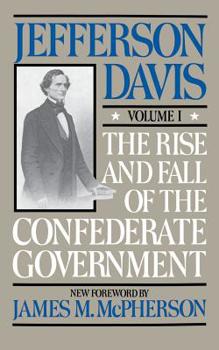The Rise and Fall of the Confederate Government: Volume 1
Select Format
Select Condition 
Book Overview
A decade after his release from federal prison, the 67-year-old Jefferson Davis--ex-president of the Confederacy, the "Southern Lincoln," popularly regarded as a martyr to the Confederate cause--began work on his monumental Rise and Fall of the Confederate Government. Motivated partially by his deep-rooted antagonism toward his enemies (both the Northern victors and his Southern detractors), partially by his continuing obsession with the "cause,"...
Format:Paperback
Language:English
ISBN:0306804182
ISBN13:9780306804182
Release Date:August 1990
Publisher:Da Capo Press
Length:704 Pages
Weight:1.58 lbs.
Dimensions:1.5" x 5.2" x 8.1"
Customer Reviews
4 ratings
Fascinating
Published by Raymond Koren , 4 months ago
I bought his book for my friend for Christmas so he has more to say on the confederacy than the basic repeated talking points he always brings up. Though this is a heafty read it has made our conversations much more interesting and thought provoking!
Economical and easily available reprint of a classic
Published by Thriftbooks.com User , 20 years ago
This is probably the most accessible reprint of Davis' book on the market today. It's well indexed and available at an economical price. My only complaint is that they got James McPherson, a confederacy-hating Marxist, to write the intro.
Constitutional Justification for Secession
Published by Thriftbooks.com User , 20 years ago
In this extremely well-written book, not only does President Jefferson Davis give critical insights on the events leading up to and including the War for Southern Independence (rare and very important in and of itself, given that he was the president of the Confederacy), but he also shows that he was a Constitutional scholar unparalleled by today's crop of so-called "experts".President Davis was a reluctant secessionist. In fact, he had been working on trying to come to a compromise until his state seceded, and he returned home. This book does a great deal to show the character of the former president of the Confederacy, with his perceptions of events leading up to the war itself. For instance, he did not envision himself to be the president of the Confederacy, believing that position should instead go to Albert Johnston. Instead, he had thought he would receive a commission as general.While there is plenty of information for virtually anyone interested in that period (there is detailed information about battles, insights by the president on figures living at the time, etc.), what truly makes the book such a fascinating read is the constitutional analysis (particularly regarding the secession question, but also going into the grievances by the Confederate states as well) found therein.If there is a negative to this book, it is the poorly-written introduction by leftist and Lincoln apologist McPhearson. I don't know why he was chosen to write the forward, but it is best ignored.I cannot recommend this book highly enough. It is a magnum opus in Southern literature.
YES, it DOES Matter!
Published by Thriftbooks.com User , 23 years ago
I strongly feel that it does matter a great deal whether Davis or Lincoln was correct. And I don't think that correctness is 'determined' by who has the biggest sword. In other words, 'might doesn't make right'. And it is sad that one of the issues over which state sovereignty was argued was the slavery issue. It is also sad that northerners weren't so sympathetic with abolitionists until after slavery became either outlawed or unprofitable - when it was, they were fine with it.Anyone who enjoyed this book MUST also read 'America's Caesar' by Durand .... His book goes into much more detail over the question of state sovereignty. The right to secede wasn't questioned until all of the founding fathers had passed away and their personal reactions and testimony could no longer be given. Also, one much remember that in 1830, the transcripts of the debates at the constitutional convention were still 'locked' and were not available to the public. The right of secession was not only acknowledged prior to the 1830's, but it was one of the most sacred rights. William Rawle's (a Federalist even) textbook 'A View to the Constitution of the US' even held that states had the right to secede and this book was used as a textbook at West Point up until the early 1840's and is still in the West Point library to this day.What changed things was when a man named Story wrote another opinion (again after all the founding fathers were dead and could no longer speak) that the Union was perpertual and that states 'drew their very breath from the Union who created them'. Even Lincoln himself, in 1850 acknowledged in a speech that states had the right to secede. But after succombing to Story's distorted and incorrect logic, he because a 'perpetualist' following the theory that 'once in there is no way out' (of the Union). This would be akin to marrying someone and there being no divorce or even separation available no matter how horrid the circumstances.It is sad that this issue cannot receive national debate even in this day and time so that all can be aired - now that we have the advantage of TV and internet and all could hear and participate.Read this book and the one I have referenced if truth matters to you at all. Jefferson Davis was Right. It is just sad that slavery was made the issue of whether or not to sustain state sovereignty.





